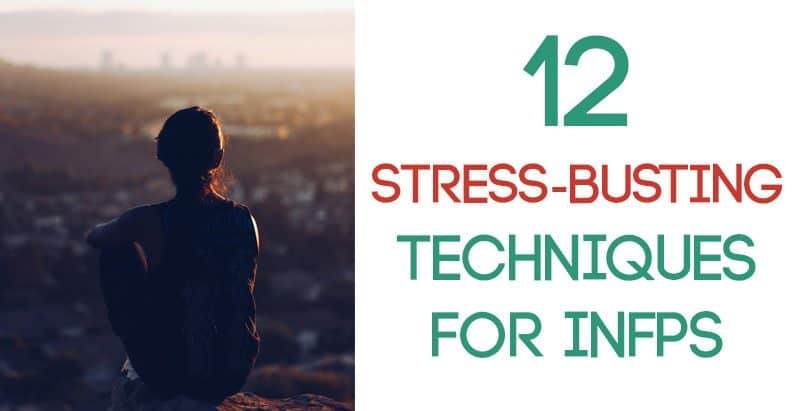12 Stress-Busting Techniques for INFPs
INFPs are some of the most insightful, deep-thinking Idealists of all the personality types. They are quick to listen, slow to speak, and generous in their compassion towards others. They can be iconic writers, groundbreaking musicians, empathetic counselors, or innovative thinkers. Today I want to focus on how INFPs can combat stress in their lives. There are two different types of stress to examine here: regular, everyday stress, and chronic stress that leads to an INFP being “in the grip” of their inferior function; Te (Extraverted Thinking). Both types of stress will result in different reactions and needs from the INFP.
Not sure what your personality type is? Take our new personality questionnaire here. Or you can take the official MBTI® here.

Everyday Stress
Regular, everyday stress is unavoidable to anyone and will normally result in the INFP trying to solve the problem by using their Introverted Feeling or Extraverted Intuition. As a result, the INFP may become simply more INFP-like. They may need to get away and examine their feelings internally, analyzing them, and finding out how to handle something in a way that coincides with their values and emotions. They may try to solve a problem by using Extraverted Intuition; looking for alternative possibilities or an imaginative way to handle a problem.
“Grip” Stress
In the case of chronic, “grip” stress, INFPs may wear out their dominant Fi (Introverted Feeling) and Ne (Extraverted Intuition) and become immersed in their inferior function; Extraverted Thinking. This often happens when INFPs are in an environment that doesn’t suit their natural strengths. Being in an atmosphere of negativity, constant conflict, and criticism will cause them chronic, intense stress since it conflicts with their naturally understanding, compassionate mindset. If they spend way too much time around people, and aren’t able to adequately access their Introverted Feeling, this may also result in a “grip” stress reaction. INFPs can also have a grip reaction when one of their core values is violated. They hold so strongly to their beliefs and their ideals, that when those are stepped on, it can force the otherwise calm INFP into their inferior Extraverted Thinking as a way to retaliate. We could go into a lot more details on grip-related stress, but I really want to focus here on how to manage that stress. I will address the stress itself more in a future post.
How INFPs Act and Feel When “In the Grip” of Extraverted Thinking
When INFPs are in the grip of their inferior function, they will do things that are typically out of character. Suddenly, the INFPs Extraverted Thinking becomes the only way they can think of to handle a problem. As a result, they may become obsessed with fixing perceived problems, and righting wrongs. They may blurt out hostile thoughts or engage in destructive fantasies directed at the people who they feel are the perpetrators of their pain. They also may employ biting sarcasm and cynicism, which is unusual to their normal understanding temperament. They may become aggressively critical to others and themselves, dwelling on all the “facts” necessary to support their overwhelming sense of failure. They will feel lost and confused and try to find logical answers to their problems, but feel like they are searching in the dark. They may become unable to access their feeling or intuitive powers; becoming “stuck” without being able to process information, thoughts, or ideas.
It’s good to remember that an INFP experiencing a “grip” reaction is not at all like their normal, balanced self. INFPs are usually extremely understanding, kind-hearted, and patient. An INFP having a “grip” reaction will seem more like an unhealthy ESTJ. This will be extremely confusing to them, and they will feel out of control and lost. Afterwards, they may feel intense remorse over their reaction and experience – at that point, it is vitally important for their loved ones to show them acceptance, kindness, and the kind of compassion INFPs are so famous for showing others.
What Makes INFPs Stressed?
– Rigidity in rules and timelines
– Having their values violated
– Not enough time alone. Too much socializing.
– Too many demands on their time
– Small-talk
– A lack of authenticity from others
– Having their creativity stifled
– Having to focus too extensively on sensory/concrete details
– Criticism or confrontation
Not sure what your personality type is? Take our new personality questionnaire here. Or you can take the official MBTI® here.
12 Ways INFPs Can Get Relief From Stress
1 – Get Some Alone Time
INFPs can quickly wear out if they are constantly socializing or dealing with people. During everyday stress or “grip”-related stress, getting away from it all is key. The INFP should get some space to themselves, quiet their minds, and just let the feelings pass through them until they start to feel more like themselves and calmer.
2 – Exercise
Many INFPs report feeling better if they can go out for a jog, ride a bike, or take a walk through nature. Being able to do this helps the INFP to escape their inferior Thinking function and use the tertiary Sensing function as a pathway back to complete equilibrium. Many times people can escape a “grip” reaction by using their tertiary function as a pathway back to balance and calmness. For the INFP, using their tertiary Sensing is a great way to do this.
3 – Read a Book
INFPs are imaginative and creative people who love to explore alternate worlds and ideas. When they are experiencing everyday or “grip” stress, being able to escape into a story can really help. This is a way for them to access their rich imaginative intuition without having to come up with ideas on their own. They can relax and open up that part of their mind by simply reading a book, and it can truly help them to feel balanced and optimistic again.
4 – Just Say “No” to Extra Responsibilities
Deadlines and a full schedule can be a nightmare for an INFP; especially one who’s already stressed out. INFPs under stress will feel better if they can look at their schedule and cancel any non-essential tasks. They may feel bad doing this, especially if they are canceling something to do with a friendship or relationship, but if they are experiencing extreme stress they really just need to be able to say “Sorry! Can’t do this right now!” and take a step back to recuperate.
5 – Talk to Someone Who Will Empathize and Listen Without Trying to “Fix” It
After a period of alone time, INFPs are often helped by talking to a friend or family member who can listen without trying to jump in and “fix” the problem. In stressful situations, INFPs want someone who will listen and empathize; not someone who will try to solve the problem. They may even want to vent their anger and criticism that has become so pent up while they were experiencing their “grip” reaction. In this case, they want someone who will listen and have compassion; someone who will understand that the INFP is not in their normal mental zone, and needs understanding. INFPs usually feel bad after they’ve had a “grip” reaction, and having a friend who can be understanding and just listen without reacting or judging is very important.
6 – Journal
Many INFPs mention writing and journaling as an effective way of managing stress. If they are experiencing everyday stress, they can get their feelings out on paper, come up with imaginative ways to solve the problem, or write about how the experience is making them feel. If they are experiencing grip-related stress, they can write out all their negativity on paper and get it out that way.
7 – Take a Hot Bath
Taking a warm bubble bath gives the INFP two things they desperately need when under stress; alone time and a sensory experience. The INFP can get some peace and quiet to think things through, and they can access their tertiary Sensing side by enjoying the warmth and relaxation the bath gives them. Both of these things can help them to balance out their functions and feel more peaceful again.
8 – Listen to Music
Music gives the INFP a way to escape their current feeling of being lost and without answers, and lets them just feel whatever emotions the music lends them. Music also allows them to access their tertiary Sensing side and lets them relax more and just take in the musical experience. The type of music INFPs will enjoy varies from person to person; some INFPs mentioned blasting loud, industrial music as a way to regain equilibrium; others enjoyed peaceful indie music. Either way, INFPs are greatly affected by music as a way to handle stress and manage their feelings.
9 – Spend Time with a Pet
Dominant Introverted Feelers, like ISFPs and INFPs, often have a soft spot for pets. I’m sure there are some INFPs who aren’t fond of pets, but the majority seem to have a deep love for their furry friends. Many INFPs mention spending time with their pet as a great way to relieve stress. Taking their dog for a walk, snuggling up on the couch with a kitten, or throwing a ball to their ferret. These kinds of activities let the INFP engage their Introverted Feeling side in a solitary way where they are not forced to deal with other people barging into their thought process or making them handle things before they’re ready.
10 – Meditate or Pray
INFPs, and nearly all Idealist personality types, are greatly affected by meditation and/or prayer. Being able to completely zone out from people and responsibilities and focus on finding peace and calm or spiritual harmony is an excellent way to regain balance and perspective.
11 – Look at, or Create Art
INFPs are greatly affected by beautiful imagery and the stories behind various pieces of artwork. Looking at artwork or creating artwork helps them to engage their tertiary Sensing side, and it also helps them to access their intuition and feeling, which may become more pronounced because of the emotions a piece of artwork can provoke.
12 – Have Sex
Okay, I don’t usually talk a lot about sex on my blog – but this one came up a lot! After a period of alone time and returning to balance, many INFPs mentioned sex as a great way to “get out of their heads” and get back to feeling like themselves again. Again, sex can open up the tertiary Sensing side of the INFP, and can be an effective way of re-balancing their functions and getting away from critical thoughts.
The INFP and Stress
Find out more about your personality type in our eBook, Discovering You: Unlocking the Power of Personality Type.
What Do You Think?
Do you have some great stress-relief tips for INFPs? What do you do to get control of your emotions and feelings? I’d love to hear from you in the comments!
Find out more about your personality type in our eBooks, Discovering You: Unlocking the Power of Personality Type, The INFJ – Understanding the Mystic, and The INFP – Understanding the Dreamer. You can also connect with me via Facebook, Instagram, or Twitter!
This post contains affiliate links. I only recommend products I truly believe in.
Check out more articles!
Getting to Know the INFP’s Shadow Functions
10 Things You Should Never Say to an INFP
Subscribe to Our Newsletter

Want to discover more about personality type? Get the inside scoop with Susan Storm on all things typological, along with special subscriber freebies, and discounts on new eBooks and courses! Join our newsletter today!
















You can add on top of listening to music, making music. For me its Playing and practicing the piano. I find its emotionally relieving and stress relieving to use my energy on playing a beautiful song such as Beethoven’s Moonlight Sonata or any classic. Afterwards Im back to my happy, positive and go-lucky self again.
So crazy! I’m an INFP and moonlight sonata is my go-to sing to play on the piano when I really want to “feel” the emotion and connection of what I’m playing. Sometimes I like to practice the piano with drills. I’m not emotionally connected at the time but I like the thought of improving and making myself better.
I have found the best way to get out of my head is dancing. Especially partner dancing. Moving my body, having someone hold me and feeling the music help me tap into the hear and now of a complete sensory experience!
Meditation and spending some quiet, high quality time with a very close friend. Someone who makes you feel like yourself because you don’t have to put a mask on around them. Spending some time with one person like that always helps me to find my balance and makes me feel grounded. But not too much time, though 😀 a couple of hours a week are enough 😀
This is so much me, I am shocked. I’m sending this to me husband so he can better understand me. Thanks!!
I’d like to say I do not think MBTI can describe me, but the funny thing is one recent test remarked me again ‘you are still INFP type’ so… it seems one’s character is hardly changeable… There are always battles in my head like, I want to be alone but don’t want to be lonely, and it is hard to tell the people next to me ‘I like you but let me be alone and it is nothing personal.’ I thought that the best solution is going to somewhere never have been and being anonymous… well, I thanks for the tips above. One thing made me feel like quite…well….I got it. Lol. Thanks again.
Just completely spot on from all different sights. I love that you mentioned that we hate liars/ING or manipulators/ING.. Others say we manipulate which had me so confused that I must be another type as I really dispise being manipulated or lied to, specifically serious matters.
I was looking on how to relieve stress and you have every thing that I usually do to get rid of stress Amazing… Thankyou so much. I cannot say how much I appreciate the time, effort, understanding and honesty you have put into your articles.
I am happy to say that I will be working on understanding my partner who is an Infj with your website.
We have had some rough patches as he is very private which gets me thinking too much and it hurt me when he was calling me names that I began getting ‘in the grip’ mode out of not understanding.
I began making acussations out of shock from his changed character, which made me then feel guilty ;him angrier and us going in circles.
Now I have a better understanding that he isn’t necessarily hiding from me or doesn’t want to spend time with me.. Just some space. I feel I can breath and not feel guilty for taking time out myself to heal.
We seem to be cooperating better.
Sorry for such an essay… I’m just genuinely so thankful for you and you having shared your passion ?
Been really struggling to understand my husband. I am one to “fix” things and he has consistently tested as an INFP. His company even had a corporate psychologist work with all the managers at a retreat and still INFP, but he’s an engineer (high IQ) and works as a quality manager at a high level. He is certainly stressed. I have thought him to be an INTP, but he relates to the INFP more anyway. I’m here reading about stress, right and I can’t be something that I am not, but that makes for a challenge. I want good for him, but does that mean – too bad for him? We are in our 40s. Both of us accepting ourselves as we are, trying to let go of gender roles we were raised with, but I think he has expectations on me to “be” more female and I’m stressed too because I have spent my entire life trying to “be” correct (though still failing cuz we do tend to, you know “prefer”). If he is truly INFP this new promotion might just eat him up. At least the 2 of is are introverted, but with Te I seem to (as per above) be pushing stress triggers in my attempts to being helpful. He wants to change his career and now I wonder if he truly needs to. But to what? His entire life has been directed to engineering. . . And while i certainly could take the lead in family income, i have not developed my career for the raising of children (my greatest stress trigger). So we each took the “gender” expected path in life and each is kind of stuck. Sigh. The answer, the correct or right path has not become clear, I know with time I will “know” what that is, but I think understanding how actual function is required for me to “see” it.
It’s so many years in chronic stress. He doesn’t know his function. I suppose we could do a course, but as per the listed triggers, I’m supposed to essentially stay out of it, correct? I
He’s an istp